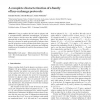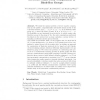48 search results - page 4 / 10 » Computing Inverses over a Shared Secret Modulus |
IJISEC
2002
15 years 2 months ago
2002
Using a random deal of cards to players and a computationally unlimited eavesdropper, all players wish to share a one-bit secret key which is informationtheoretically secure from t...
128
click to vote
CRYPTO
2007
Springer
15 years 8 months ago
2007
Springer
Abstract. We study the natural problem of secure n-party computation (in the passive, computationally unbounded attack model) of the n-product function fG(x1, . . . , xn) = x1 · x...
145
click to vote
STOC
2009
ACM
16 years 3 months ago
2009
ACM
We study the question of basing symmetric key cryptography on weak secrets. In this setting, Alice and Bob share an n-bit secret W, which might not be uniformly random, but the ad...
118
click to vote
NIPS
2008
15 years 3 months ago
2008
The inverse dynamics problem for a robotic manipulator is to compute the torques needed at the joints to drive it along a given trajectory; it is beneficial to be able to learn th...
144
click to vote
PAISI
2010
Springer
15 years 11 days ago
2010
Springer
Abstract. This paper introduces an efficient privacy-preserving protocol for distributed K-means clustering over an arbitrary partitioned data, shared among N parties. Clustering i...


